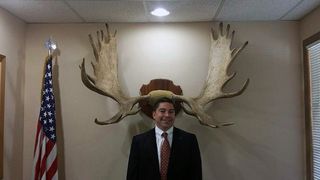FCC Commissioner says fast broadband is a novelty
Don't expect the FCC to push for faster broadband service in residential homes.

For the most part, 1Gbps Internet service is a pipe dream for any U.S. resident who doesn't live in a major metropolitan area. If you were hoping that might change at the urging of a new FCC commissioner, don't hold your breath. FCC Commissioner Michael O'Rielly hasn't been one to push for faster broadband, and he's certainly not a champion of expanding 1Gbps to more areas. Instead, he views ultra-fast broadband as a "novelty" for consumers who already have access.
"The outcry for things like ultra high-speed service in certain areas means longer waits for those who have no access or still rely on dial-up service, as providers rush to serve the denser and more profitable areas that seek upgrades to this level," O’Rielly said, according to Fierce Telecom. "Today, ultra-fast residential service is a novelty and good for marketing, but the tiny percentage of people using it cannot drive our policy decisions."
O'Rielly is assuming that expanding ultra-fast broadband and striving for ubiquitous broadband coverage can't occur at the same time. Some may agree with him, but what's concerning is that he doesn't seem to place any kind of urgency on faster connections. As TechDirt points out, when the FCC proposed increasing the standard definition of broadband from 4Mbps up and 1Mbps down to 25Mbps up and 3Mbps down, he voted against it.
"To justify setting the new benchmark at 25/3, as opposed to the current 4/1 or even 10/1 as several commenters suggested, the report notes that 4K TV requires 25Mbps. But 4K TV is still relatively new and is not expected to be widely adopted for years to come," O'Rielly wrote in his dissent (PDF). "While the statute directs us to look at 'advanced' telecommunications capability, this stretches the concept to an untenable extreme. Some people, for example, believe, probably incorrectly, that we are on the path to interplanetary teleportation. Should we include the estimated bandwidth for that as well?"
Yes, O'Rielly put the need for faster broadband to support 4K streaming on the same level what would be required for interplanetary teleportation. Both are an "untenable extreme" in his eyes.
What brought all this into view is a $20 billion proposal by a group of Democrats to expand "high speed and affordable broadband" in underserved areas. It was proposed as an alternative to U.S. President Donald Trump's proposed trillion-dollar infrastructure initiative.
"While sound telecom policy provisions that promote infrastructure build out could make sense, I would argue that policymakers should be leery of new communications infrastructure spending, as the last thing consumers or businesses need is an encore of the market distortions caused by the last Federal government economic stimulus efforts," O’Rielly said. "For the sake of efficiency and soundness, if new government money has to be included for broadband, it should be done in a way that does not harm competition in the marketplace, prevents bureaucrats from picking winners and losers, is technology agnostic, distributes resources in an effective and efficient manner, and does not undermine the FCC’s universal service high-cost program."
PC Gamer Newsletter
Sign up to get the best content of the week, and great gaming deals, as picked by the editors.
According to Akamai (PDF), the average Internet speed in the U.S. is 16.3Mbps.
Paul has been playing PC games and raking his knuckles on computer hardware since the Commodore 64. He does not have any tattoos, but thinks it would be cool to get one that reads LOAD"*",8,1. In his off time, he rides motorcycles and wrestles alligators (only one of those is true).
Most Popular






